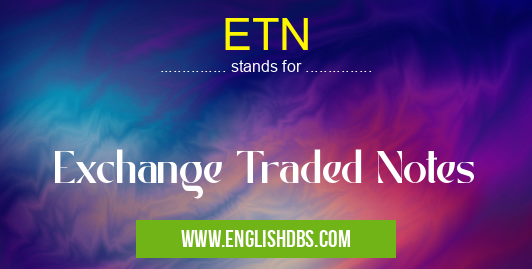What does ETN mean in STOCK EXCHANGE
Exchange Traded Notes (ETNs) are financial instruments that track a specific index or asset class and provide investors with a way to gain exposure to such assets without actually having to purchase them. ETNs are unsecured debt securities issued by banks and other financial institutions, similar to bonds but with some important differences. They offer a range of advantages and risks for investors, compared with other options like stocks, ETFs, and mutual funds.

ETN meaning in Stock Exchange in Business
ETN mostly used in an acronym Stock Exchange in Category Business that means Exchange Traded Notes
Shorthand: ETN,
Full Form: Exchange Traded Notes
For more information of "Exchange Traded Notes", see the section below.
Essential Questions and Answers on Exchange Traded Notes in "BUSINESS»STOCKEXCHANGE"
What is an ETN?
An Exchange Traded Note (ETN) is an unsecured debt security issued by banks or other financial institutions that tracks a certain index or asset. The value of the ETN is linked to the performance of this underlying asset or index.
How do ETNs compare to stocks and ETFs?
Stocks represent ownership in a company while ETFs represent baskets of securities like stocks, commodities, or bonds. Unlike stocks and ETFs, ETNs do not require investors to directly own the underlying assets; instead they just buy into the performance of those assets through the debt instrument.
What types of returns can be expected from ETNs?
The returns on an Exchange Traded Note depend on the performance of its underlying asset or index. Returns may be positive or negative depending on how well it performs over time as there is no guarantee of how it will move in any given period of time.
Who issues ETNs?
Exchange Traded Notes are issued by banks and other financial institutions in order to track certain indices or assets that they have acquired positions in.
Are there any risks associated with investing in ETNs?
Yes, like all investments there are risks associated with investing in Exchange Traded Notes including credit risk - if the issuer defaults on their payment obligations - as well as tracking errors - if the return does not match up exactly with that which has been predicted by the issuer due to market fluctuations.
Final Words:
: Exchange Traded Notes offer investors a way to gain exposure to certain indices or assets without having to purchase them physically themselves. However, these products come with inherent risks such as credit risk and tracking errors which all potential investors must weigh before deciding whether they want to invest in them or not.
ETN also stands for: |
|
| All stands for ETN |
